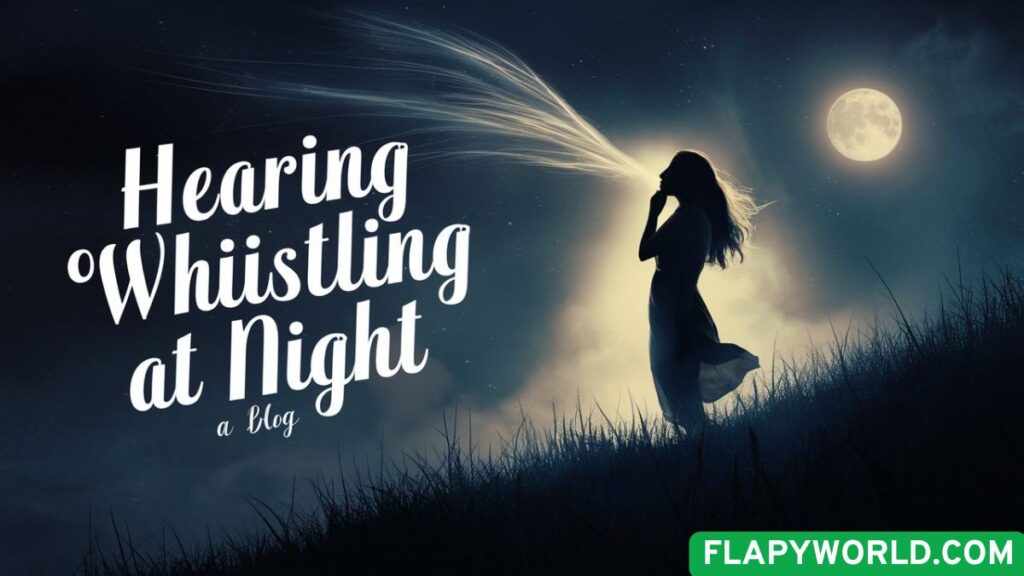Hearing whistling at night means noticing strange sounds in the dark. It can feel unusual when the world is quiet. Many believe it carries hidden meaning or warning. Some see it as a sign of energy or spirit nearby.
Have you ever heard whistling when the night was still? The sound can feel mysterious and even unsettling. People often wonder if it has a deeper message. Such moments can stay in your thoughts for long.
Hearing whistling at night can mean guidance or caution. Some say it shows unseen forces or spiritual presence. It may also point to protection or hidden messages. It is often linked with awareness and intuition.
Spiritual Meanings and Symbolism of Nighttime Whistling
Whistling at night is often believed to be a form of spiritual guidance through whistling, a way for the universe or spirits to communicate with us. The whistling sounds spiritual symbolism can range from a simple warning to a message of love and protection. Many spiritual teachers say that these sounds come from the spirit realm communication, where messages are sent through sound vibrations.
One interesting fact is that whistling uses breath control, which is closely connected to energy flow in the body and can link to whistling and chakra energy. This makes whistling a powerful spiritual symbol in many cultures around the world.
Divine Guidance and Protection
One of the most common spiritual meanings of whistling at night is that it signals guardian angels whistling or divine beings offering protection. Many people report hearing soft, melodic whistles when they feel watched over or safe, even in difficult times. This type of whistling as spiritual guidance often brings comfort and reassurance, showing that you are not alone.
For example, some people hear gentle whistles during moments of crisis or stress, which they interpret as a sign that their guardian angels are nearby, protecting them from harm. This is a clear message of spiritual guidance through whistling, reminding us to trust in unseen help.
Messages from Departed Loved Ones
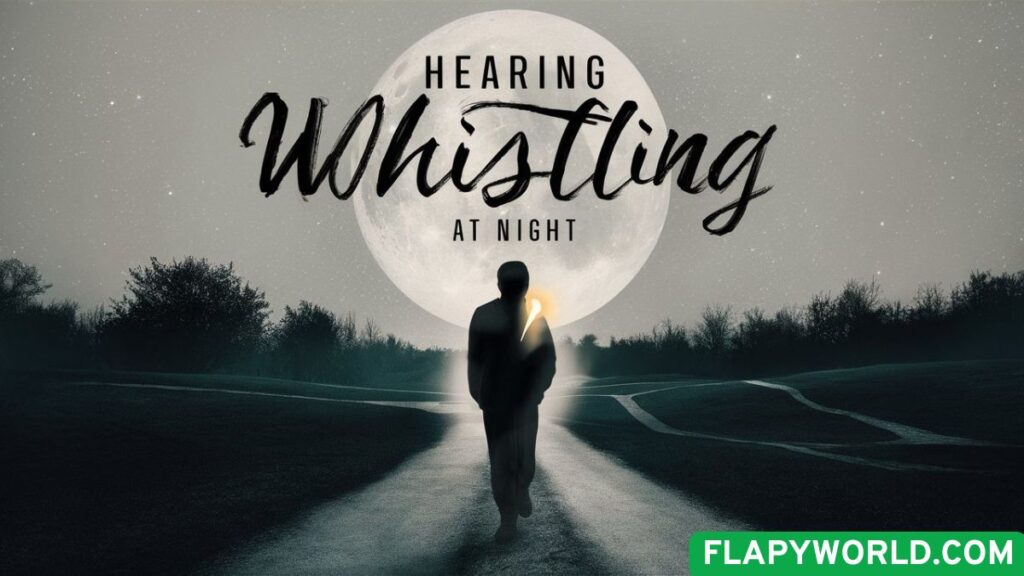
Many believe that ancestral spirit whistles or whistling and spirit communication are ways that departed loved ones try to send messages from the other side. These whistling sounds spiritual symbolism often appear as familiar tunes or soft calls that evoke feelings of love and connection.
In some American families, it is common to hear a whistle that reminds them of a late family member, which is seen as a sign of their presence and care. This idea connects deeply with the concept of spirit communication through sound, where whistles act as bridges between the living and the dead.
Warnings of Impending Danger
Sometimes, hearing whistling at night is not so comforting. Many spiritual traditions say that sharp, sudden whistles are spiritual warnings through whistling, alerting us to possible danger ahead. These can be warnings about physical threats or energetic disturbances.
People often report that when they hear loud or urgent whistle sounds, their intuition heightens, and they feel a strong need to be cautious. These spiritual alerts at night are considered important signs that encourage vigilance and protection.
Awakening of Intuition and Psychic Abilities
The subtle, often faint whistle sounds many experience at night are thought to be signs of psychic awakening signs or the whistling spiritual awakening process. When you start noticing these sounds regularly, it might mean your intuitive powers are growing.
This connection between whistling and spiritual intuition encourages people to practice meditation for spiritual signs and keep a journal spiritual experiences to better understand their personal growth. Many spiritual teachers say that hearing these whistling as a spiritual sign means your inner senses are opening to higher frequencies and messages.
Presence of Supernatural Entities
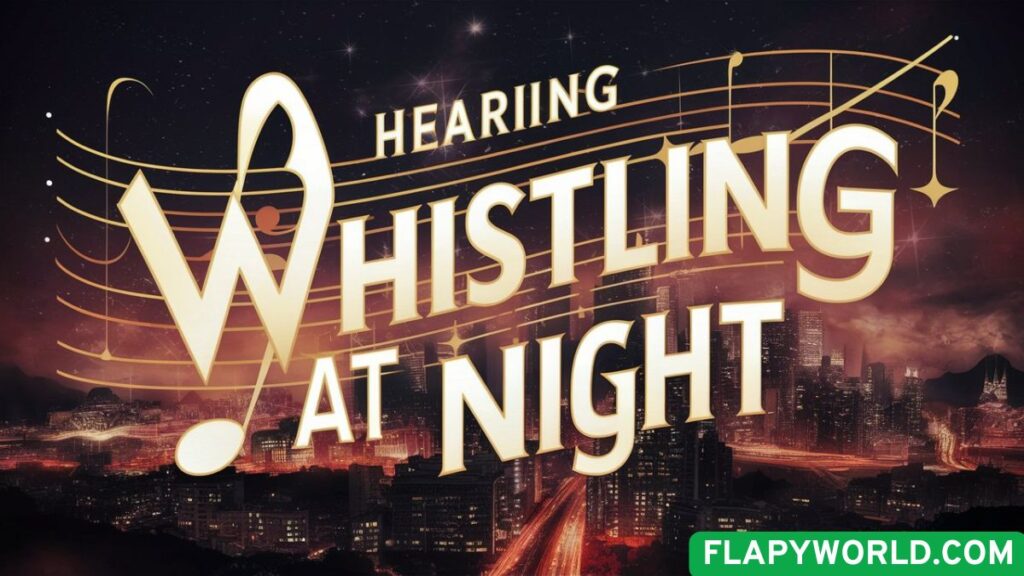
In some cases, the spiritual significance of whistling involves encounters with supernatural beings. Unusual, eerie, or rhythmic whistle sounds at night might signal the presence of spirits, nature elementals, or other mystical creatures. These supernatural whistling sounds are often described in folklore and paranormal stories.
People who hear these whistles are sometimes warned to protect themselves through spiritual defense and whistling, such as using smudging or prayers. This idea appears in many cultures, including whistling in spiritual traditions that teach how to keep balance when facing these mysterious sounds.
Alignment with Spiritual Energies
Harmonious and soothing whistles at night are often seen as signs of alignment with spiritual energies. These sounds may reflect balance within your energy centers or a deep connection with the universe. In modern times, this idea connects with the growing interest in energy healing and mindfulness.
For example, many people who hear peaceful whistles report feeling calm and centered. This can relate to whistling and energy centers, where the sound acts like a gentle reminder of spiritual harmony. The practice of whistling as mindfulness practice can enhance this feeling by helping to regulate breath and focus attention.
Call for Spiritual Growth and Transformation
Finally, some whistle sounds at night can act as a call for spiritual growth and transformation. Intense or unexpected whistles might push you to face challenges or embrace changes in your life. This message is common in spiritual traditions that view sound as a powerful tool for awakening.
When you experience these whistles, it is important to open your mind to spiritual messages in whistling sounds and reflect on areas where you need growth. Many spiritual advisors encourage using these moments to deepen self-awareness and healing.
Cultural Perspectives on Hearing Whistling at Night

The meanings of nighttime whistles can change depending on cultural backgrounds. In the USA, a melting pot of many traditions, cultural symbolism of whistling is rich and varied.
In Eastern beliefs and traditions, such as Chinese and Japanese cultures, whistling at night is sometimes seen as attracting spirits or bad luck. This belief influences many Asian-American families, who approach these sounds with caution.
In Western folklore and superstitions, whistling indoors or at night is often considered taboo or a sign of bad omens. For example, some European-American stories describe whistling as calling ghosts or bringing bad fortune.
Among Indigenous interpretations, especially in Native American spirituality, whistles are connected to ancestral spirits and animal guides. These cultures often view whistles as sacred calls that connect humans with nature and the spirit world.
Types of Whistling Sounds and Their Interpretations
Different types of whistles carry different meanings. Here is a table that shows common whistle types and their spiritual interpretations:
| Whistling Sound | Spiritual Interpretation | Example Meaning |
| High-pitched whistles | Urgent warnings or spiritual alarms | Danger is near, be alert |
| Low, melodic tones | Messages from guardian spirits or ancestors | Comfort, protection, love |
| Rhythmic patterns | Coded messages needing reflection | Meditate, pay attention to your inner voice |
| Faint, distant sounds | Subtle spiritual nudges and intuition growth | Psychic awakening signs |
| Loud, abrupt whistles | Immediate call for caution or defense | Spiritual attack warning |
Knowing these types can help you interpret the spiritual meaning of random whistles and understand what the universe might be trying to communicate.
Distinguishing Spiritual Whistling from Natural Sounds
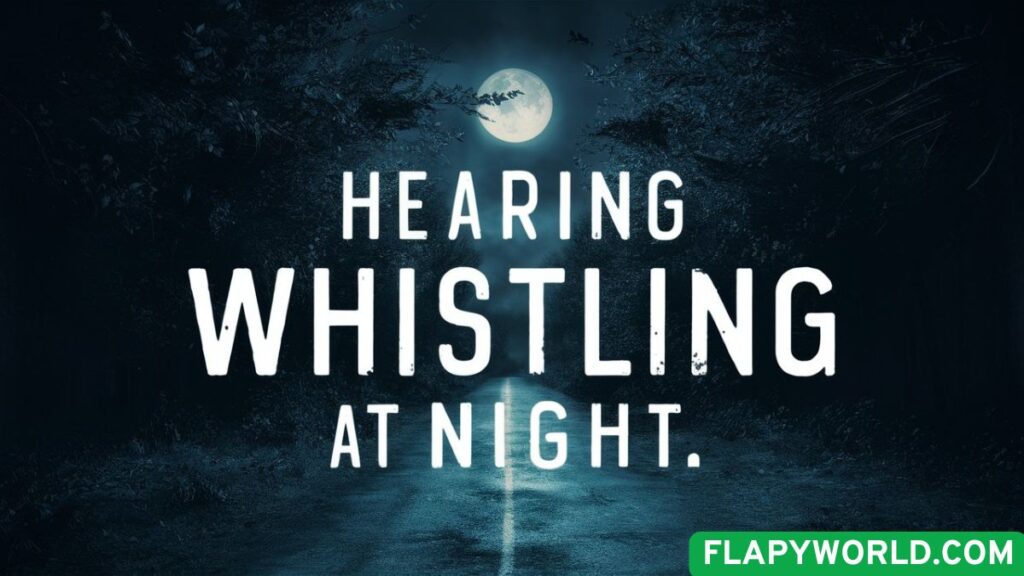
It is important to learn how to separate natural sources of whistling from spiritual messages. Natural whistling can come from the wind, animals like birds, or household objects like pipes. In the USA, common environmental sounds can often be mistaken for spiritual whistles.
However, recognizing spiritual qualities in sounds depends on feelings and timing. Spiritual whistles often feel different—they might evoke strong emotions, repeat unusually, or appear at significant moments. Keeping a journal spiritual experiences and practicing mindfulness can help develop this awareness.
Read Also: Orange Cat Spiritual Meanings, Lessons, and Messages
Responding to Spiritual Whistling Experiences
When you hear unexplained whistling at night, the best approach is to remain calm and open. Notice your emotions and surroundings. Acknowledge the experience and express gratitude for the message. You might choose to meditate and seek deeper understanding through meditation for spiritual signs.
Many people find protection in rituals such as smudging, prayers, or affirmations. These practices build spiritual defense and whistling protection, helping you stay balanced and safe. It’s also helpful to talk with spiritual advisors who understand the whistling spiritual awakening process.
The Whistle of the Soul
Whistling isn’t always just a sound; sometimes, it’s a message. In many spiritual traditions, a whistle heard in silence—especially at night—can be a whisper from the soul or spirit realm. Whether it’s a guiding signal, a warning, or a sign of presence, the sound carries energy.
This section introduces the idea that hearing whistling at night may not be random, but a form of spirit communication.
Whistling: More than Just a Melody
We often think of whistling as music. But spiritually, it can be much more. Whistling may represent unseen energies trying to express something.
Whether from ancestral messages through whistling, spiritual alerts at night, or even whistling as divine communication, this sound carries emotional and energetic significance.
Whistling as a Spiritual Practice: The Melody of Mindfulness
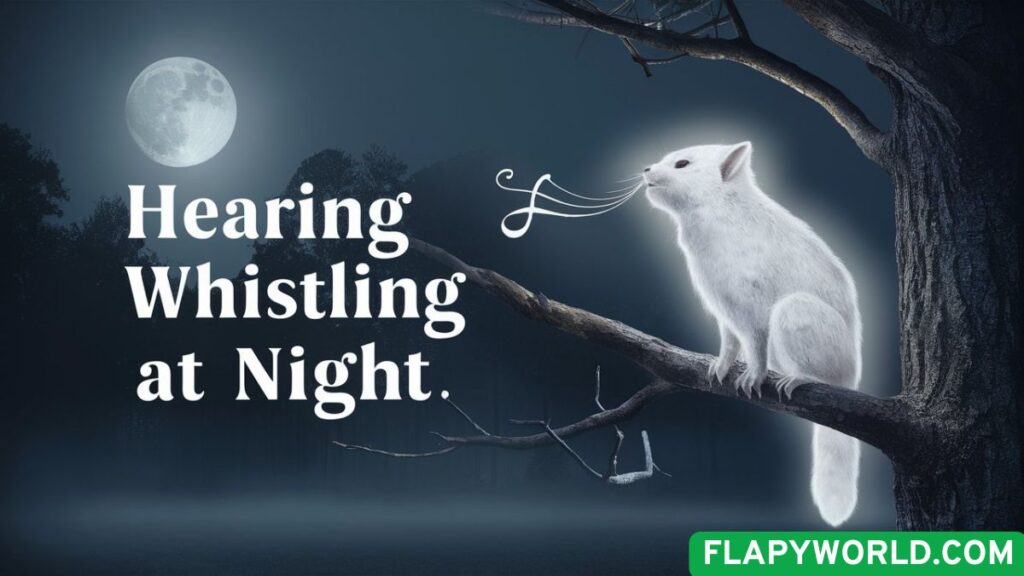
Some spiritual practices use whistling as a tool for mindfulness and energy alignment. Like chanting or singing bowls, whistling and vibrational frequency can calm the mind and activate chakra energy.
Here, we explore how controlled, intentional whistling can be a form of meditation or prayer.
The Shaman’s Song: Whistles in Ancient Traditions
Ancient cultures saw whistles as sacred. In shamanic use of whistles, the sound was believed to connect to spirits, animals, and ancestors.
From Native American spirituality to African tribal rituals, whistling summoned wisdom or healing. This section dives into how traditional healers used whistles in ceremonies.
The Harmonics of Healing: Whistle Your Way to Wellness
Believe it or not, whistling might help heal. The vibration from whistling can reduce stress and enhance spiritual well-being. This section looks at the therapeutic benefits of whistling, including breath control, emotional release, and activating positive energy and aura vibration.
Melodic Myths: Superstitions Surrounding Whistles
All over the world, there are superstitions about whistling. Some say whistling at night invites spirits. Others believe it attracts bad luck or ghosts. This section explores the cultural symbolism of whistling and why so many people, across generations, avoid whistling after sunset.
Feral Frequencies: Whistles in the Wild – Animal Spirituality
Animals whistle too—think of birds, dolphins, or certain primates. Many believe that animal whistles act as spirit guides, carrying cosmic signs and synchronicity. This section discusses how natural whistles can be messages from nature, spirit animals, or even reflections of our inner state.
The Soul’s Symphony: Famous Spiritual Whistles & Their Meanings
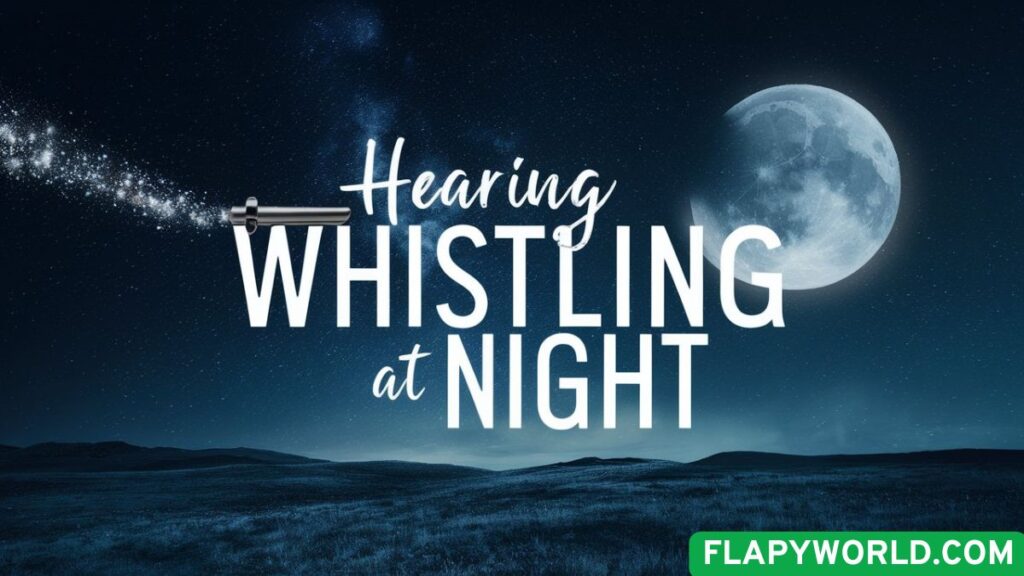
Some famous spiritual whistles are known in folklore. From the “Seven Whistlers” in British mythology to whistling banshees in Celtic stories, these legendary sounds often come with lessons, warnings, or symbols of fate. This section will tell their stories and what they spiritually represent.
The Spiritual Significance of Hearing Whistling at Night
This is the core of the article. Hearing whistling at night is one of the most reported supernatural signs. Some see it as a sign of guardian angels whistling, others say it means ancestral spirit whistles. Here, we break down the top spiritual meanings people associate with mysterious night whistles.
Common Interpretations of Hearing Whistling at Night
Not every whistle means the same thing. This section shares commonly accepted meanings like danger warnings, spiritual awakening, or messages from beyond. We’ll also touch on how spiritual traditions and personal beliefs can affect what a whistle might mean for you.
How to Interpret the Whistling Sounds
When you hear a whistle, what should you notice? This section teaches you to pay attention to tone, pitch, direction, and your emotional response. These details help you understand if the whistle is simply a breeze—or a real spiritual sign.
What Should I Do When I Hear Whistling At Night?
So, it’s 2 AM, and you hear whistling. What now? This section provides steps you can take, from journaling spiritual experiences, doing a quick meditation, to cleansing your space. Knowing how to respond keeps you safe and spiritually aware.
Should I Be Worried?
Hearing whistling doesn’t always mean danger, but sometimes it might. This section will help you figure out if the experience was a spiritual warning or just your mind playing tricks. We’ll talk about building spiritual defenses, trusting your gut, and staying grounded.
Whistling Symbolism

Whistles carry symbols: freedom, summoning, change, and sometimes, farewell. Here, we explore how whistling as a spiritual sign connects to universal emotions and energies. From dreams to real-life sounds, whistles speak louder than they seem.
What Is Whistling A Sign Of? Is It Bad?
This section answers the question many people ask: Is whistling at night a bad omen? The answer depends on context, culture, and intuition. While some believe it’s a warning, others see it as divine guidance or confirmation of spiritual alignment.
What Does It Mean When You Hear Whistling?
This is a final reflection. Here, we gather all meanings and possibilities—messages from ancestors, spirit realm communication, guardian angels whistling, and more. This section ties the spiritual, emotional, and mystical aspects into a holistic view.
Decoding The Whistle: What Does It Mean For You?
Ultimately, every spiritual message is personal. In this closing section, you’ll learn how to make sense of your unique experience. We’ll guide you to trust your intuition, look at recent life events, and meditate for spiritual signs. Your spirit may be calling—are you ready to listen?
FAQ,s
What is the spirituality of whistling?
Whistling spiritually represents communication between worlds, signaling guidance, energy shifts, or the presence of unseen entities.
Why am I hearing whistling?
You may be hearing whistling as a sign from the spiritual realm—messages from guides, ancestors, or a spiritual awakening.
What does whistling symbolize?
Whistling symbolizes alertness, transformation, spirit contact, or a call to pay attention to your surroundings and inner self.
Does whistling at night attract spirits?
Yes, many traditions believe whistling at night attracts spirits, opening a channel to the unseen and possibly inviting energies.
Why shouldn’t you whistle at night in Islam?
In Islam, whistling at night is discouraged as it’s believed to attract jinn, causing spiritual disturbances or harm.
Conclusion
Hearing whistling at night can feel strange or even scary, but it has many meanings. Some people believe it is a sign from spirits or a message from another world. Others say it is a way to feel warnings or sense energy changes around them. Many old stories and beliefs from different cultures talk about whistling sounds during the night.
This sound is not always something bad. It can help you listen to your feelings or notice what is happening around you. When you hear whistling at night, stay calm and try to understand what it might mean. It may bring guidance, protection, or a simple reminder to pay attention. Trust your feelings and stay open to learning more.

James Morris is an experienced blogger and content creator at FlapyWorld.com. With a passion for writing and sharing insightful content, James specializes in crafting engaging posts on a variety of topics, including wishes, messages, and inspirational content. His goal is to inspire, inform, and connect with readers through thoughtful and well-researched articles.

